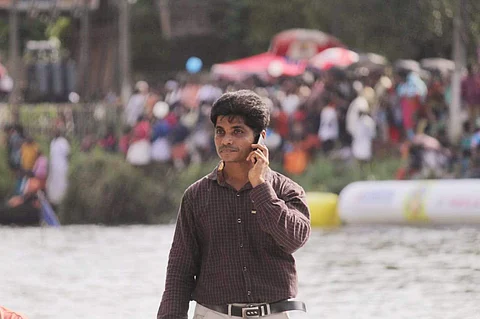

In Muhamma, a small town in Alappuzha, radios are old matchboxes. The town's favourite inventor, Rishikesh CS had figured out a way to provide entertainment to his neighbours through discarded matchboxes, and it didn't even need electricity! Would you believe that the genius behind this is a pre-degree dropout? He says, "I dropped out of college because there was too much politics. They were protesting all the time and it was too much of a distraction for me."
Back in the peaceful confines of his own home, Rishikesh asked a few of his friends from The University of New Mexico to send over a few books on electronics. He read each book from cover to cover along with some information that he collected off of the internet. He says, "My advantage was that these foreign books are a different standard entirely. It's different from the B Tech courses we have here and I had the time to learn from them at home."
In 2002, a boat capsized in his neighbourhood. Rishikesh made his way to the spot immediately and tried to put his finger on the problem. Most local boats have a raised hull. Because of this, it is difficult to see if water enters inside the platform until it becomes dangerously close to flooding the boat. So he built an early detection sensor at the bottom of it that can judge water level and let people know.
In 2012, when the whole of Kerala was concerned about the Mullaperiyar dam bursting, Rishikesh got thinking. He says, "Only the government is aware if such a disaster is about to occur. Only officials have the devices and data to measure any incoming danger. People are made to wait until a red alert is declared to know if they are in any real trouble or not. I tried to deal with this by building a small wireless vibrating device that could be used by ordinary people. Of course, this cannot help you prevent a disaster. But often, the bigger danger is when a building collapses on unexpecting people. So people have the opportunity to evacuate before it's too late."
A few years later, news broke out about a KSEB employee dying after getting electrocuted on an electricity line. Officials reported that the line was off. "I did some research of my own," says Rishikesh. "I found out that in an ordinary home, there is about 230 volts of electricity coming in. In a transformer, it is about 11,000 volts. Because it has a higher voltage, the electricity on them have a tendency to release higher discharges. I asked the engineers why there was no tester to see if they were actually off. When they were unable to come up with a satisfactory answer, I decided to build a device himself." The invention was 8 metres long. You can detect if such a device is on by simply clicking a button from the bottom. A beep sound will give you your answer, without the need to go even close to the wires.
In 2015, this invention led to Rishikesh receiving a Rashtrapathi Award from the National Innovation Foundation of India, an award given to inventors in the grassroot level. The primary requirement is that you must not have any higher education qualifications to receive the award. Basically, the idea should have come from your own brain.
Two years back, a train in Eramalloor village was turning on a particularly sharp curve. People on the other side were not able to see the train because the tracks were extremely curved and there were no warning sounds because it was running on an electric engine. Four people passed away during the incident. Rishikesh built a wireless transmitter which can pass information every 5 seconds when the train comes in its vicinity. It worked on the principle that all trains have receivers and they are all the same, like a public radio. The device recognises the signals, thus alerting people.
Rishikesh's most important invention yet came in 2019. In Trivandrum, two people were electrocuted on their way to buy some milk when an electric wire fell on them. The news spread all over the state. RIshikesh's answer was to build a device that would ensure that such current would not affect them. If five people were standing below, the device would prevent electrocution.
Today, Rishikesh has over 20 years of experience that he has built up on his own. He conducts motivation classes and BTech tuitions. Although he may have opted out of getting a formal education, hardwork and a sharp ear tuned to the public need helped him build his own legacy, one invention at a time.
